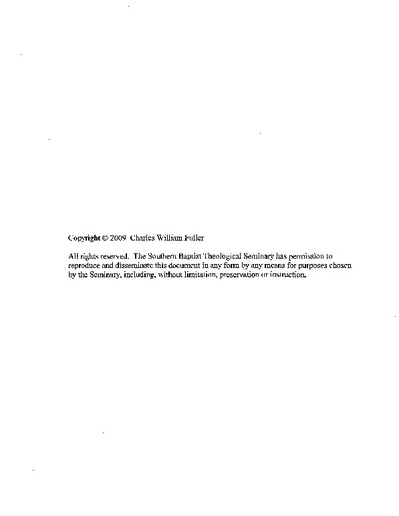An evangelical assessment and reconstruction of Phillips Brooks's definition of preaching
Subject
Brooks, Phillips, 1835-1893Preaching
Abstract
This dissertation assesses--from an evangelical perspective--Phillips Brooks's classic definition of preaching as "truth through personality" and, after pinpointing its substantial deficiencies, reconstructs it with evangelical doctrines. Chapter 1 describes the legacy of Brooks's definition among evangelicals.
Chapter 2 provides the contextual information necessary for evaluating Brooks's thought, with attention given to the way that he responded to the influences of romanticism in the late nineteenth century. Chapter 3 unveils Christ's incarnation as the foundation for Brooks's preaching definition, and observes the way that his formulation and anthropocentric application of the doctrine shapes his "truth through personality" concept.
Chapter 4 evaluates Brooks's definition in light of evangelical foundations for preaching, and identifies its three significant dangers. First, "truth through personality" promotes a nonpropositional form of revelation in which the preacher's thoughts on truth trump the truthfulness of Scripture. Second, the definition forces too close an association between God's Word and the preacher by conceiving preaching as a replica of the incarnation--an ontological impossibility and an unbiblical notion. Third, "truth through personality" embraces a classical form of rhetorical ethos that is consistent with Quintillian, but inadmissible in Christian preaching. Tested against Pauline literature, Brooks's approach to ethos appears biblically deficient and adverse to the gospel.
Chapter 5 proposes that the phrase, "truth through personality," best serves preaching when conceived as an axiom and not as a definition, and asserts that an evangelical construction of the phrase emerges only from biblical anthropological and soteriological doctrines. Constructing the phrase in an evangelical manner, though, requires three clarifications. First, preaching extends God's mode of special revelation--through human personality--not ontologically or phenomenologically, but functionally as a means of accommodating human weakness. Second, preaching--as a person-to-person encounter--forms a means by which God accomplishes his saving work. Third, when informed by evangelical anthropology and soteriology, "truth through personality" maintains the notion of the preacher as a personal witness to a divine message, not as another incarnation. Finally, the chapter discusses the practical implications of an evangelical construction of "truth through personality," including personal presentation and sermon application.

